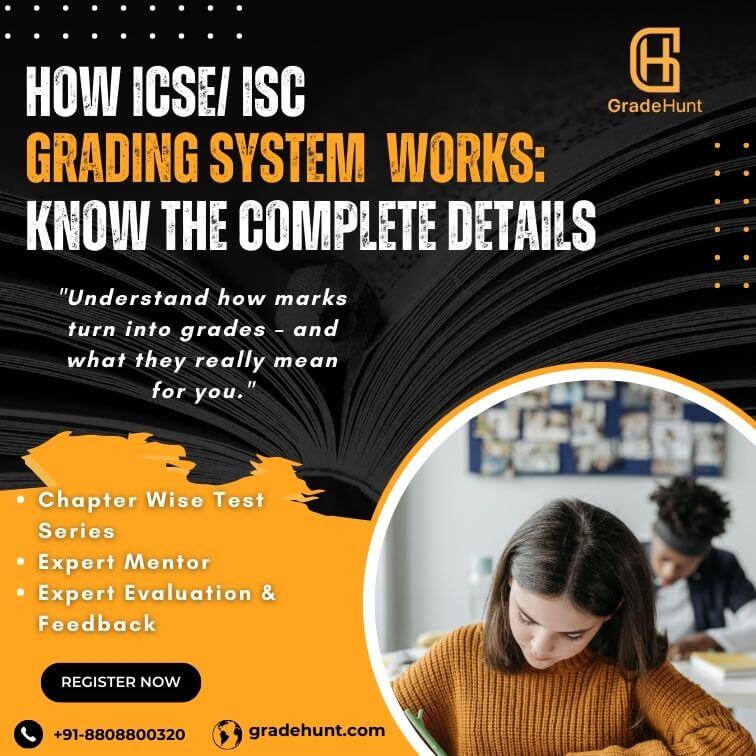
How ICSE/ ISC Grading system works | Know the complete details
The Indian Certificate of Secondary Education (ICSE) is a prestigious educational board in India, known for its rigorous academic standards and comprehensive evaluation methods. The ICSE grading system plays a crucial role in assessing students' performance in Class 10 examinations, balancing both internal and external assessments to provide a holistic view of a student's academic capabilities. This blog delves into the details of the ICSE grading system for the academic year 2025-26, explaining its structure, grading scales, pass criteria, and the rationale behind its design.
Overview of the ICSE Grading System
The ICSE grading system is designed to objectively evaluate student performance through a combination of percentage marks and grade points. It employs a nine-point scale for external examinations and a letter-grade system for internal assessments such as Socially Useful Productive Work (SUPW) and Community Service. This dual approach ensures that both academic knowledge and co-curricular contributions are recognized.
The system is structured to promote fairness, transparency, and consistency across all ICSE-affiliated schools, making it easier to compare student performance nationally while encouraging overall development beyond academics.
External Examination Grading: The Nine-Point Scale
For the external board examinations, the ICSE uses a nine-point grading scale where:
● Grade 1 represents the highest achievement ("Very Good").
● Grades 2 to 7 indicate varying levels of passing performance, with distinctions between "Very Good," "Credit," and "Pass."
● Grades 8 and 9 denote failure.
Only Grades 1 to 7 are recorded on the official certificates, emphasizing positive achievement and excluding failing grades from the formal record.
| Grade | Description |
|---|---|
1, 2 | Very Good |
3, 4, 5 | Credit (Pass with Credit) |
6, 7 | Pass |
8,9 | Fail |
Internal Assessment Grading: Letter Grades
Internal assessments cover areas like SUPW and Community Service, which are integral to the ICSE's emphasis on holistic education. These are graded on a letter scale from A to E, with:
● A being "Very Good" (highest)
● B "Good"
● C "Satisfactory"
● D "Fair"
● E "Fail"
Only grades A to D appear on the certificate, acknowledging satisfactory performance while excluding failing grades from the record.
Percentage-Based Grading and Marking Scheme
Alongside the nine-point and letter-grade scales, the ICSE also uses a percentage-based grading system for internal calculations and overall assessment. The percentage ranges correspond to letter grades as follows:
| Percentage Range | Grade | Description |
|---|---|---|
90-100% | A+ | Outstanding |
80-89% | A | Very Good |
70-79% | B+ | Good |
60-69% | B | Above Average |
50-59% | C+ | Satisfactory |
40-49% | C | Average |
33-40% | D | Below Average |
Below 33% | E | Fail |
Subject Grouping and Weightage
ICSE subjects are categorized into three groups, each with different weightage assigned to internal and external assessments:
● Group 1: Languages (English and Second Languages)
● Group 2: Humanities and Science subjects
● Group 3: Elective subjects and practical-based subjects
Typically, the external board examination carries 75% weightage, while internal assessments contribute 25%. For practical subjects like Science, internal assessments include practical exams and project work, while for languages and humanities, internal assessments may include oral tests, projects, and assignments.
Pass Criteria and Certificate Eligibility
To pass the ICSE Class 10 examination and receive a pass certificate, students must meet the following criteria:
● Secure a minimum of 33% marks in each subject.
● Achieve an overall aggregate of at least 35%.
● Appear for at least six subjects and pass in at least five, including English.
● Failures in any subject require re-examination or improvement to qualify for the certificate.
This ensures students have a balanced performance across subjects and meet minimum academic standards.
Divisions and Distinctions in ICSE
The ICSE grading system also classifies overall performance into divisions and distinctions based on percentage scores:
● Distinction: 90% and above in each subject.
● First Division: 75% to 89%.
● Second Division: 60% to 74%.
● Pass: 50% to 59%.
Achieving distinction is a significant academic milestone, reflecting outstanding mastery of subjects.
Benefits of the ICSE Grading System
The ICSE grading system offers several advantages:
● Holistic Evaluation: By integrating internal assessments like SUPW and community service, it encourages students to develop skills beyond academics.
● Fairness and Transparency: The percentile-based nine-point scale ensures students are graded relative to peers, reducing biases.
● Motivation for Excellence: Clear distinctions and divisions motivate students to aim for higher grades.
● Standardization: Uniform grading across schools facilitates fair comparisons and smooth transitions to higher education.
● Comprehensive Feedback: The combination of letter grades, numerical grades, and percentages provides detailed insights into student performance.
Preparing for ICSE Exams with the Grading System in Mind
Understanding the grading system helps students strategize their preparation effectively:
● Focus equally on internal assessments and external exams since both contribute significantly to the final grade.
● Aim for consistent performance across all subjects to meet pass criteria and qualify for distinctions.
● Engage actively in SUPW and community service to secure good internal grades.
● Use the grading scale as a benchmark to set realistic goals and track progress.
Conclusion
The ICSE grading system is a thoughtfully designed framework that balances academic rigor with holistic development. Its dual grading approach—nine-point scale for external exams and letter grades for internal assessments—ensures comprehensive evaluation of students’ knowledge, skills, and social contributions. With clear criteria for passing, distinctions, and divisions, it provides transparency and motivation for students to excel. Understanding this system empowers students, parents, and educators to navigate the ICSE academic journey with clarity and confidence.
As the ICSE board continues to evolve its assessment methods, students can look forward to a fair, balanced, and meaningful evaluation that prepares them well for future academic and life challenges.
Frequently Asked Questions
Q1.How does the ICSE grading system work for Class 10?
The ICSE Class 10 grading system is based on a 9-point scale, where marks are converted into grades ranging from 1 (highest) to 9 (lowest), with internal and external assessments combined.
Q2.What is considered a passing grade in the ICSE board?
To pass, a student must secure a minimum of Grade 6 or higher, which usually corresponds to 35% marks in each subject, including internal assessments.
Related Searches

ICSE Class 10 Semester 1 Syllabus: A Complete Guide
Are you a Class 10 ICSE student preparing for your exams? We've got you covered! This guide breaks down the ICSE syllabus while offering expert lessons and insights about Grade hunt Coaching Institute—your ultimate learning partner. Covering all subjects, including Mathematics, Science, and English, it helps you stay on track and achieve top scores effortlessly.
Indian Certificate of Secondary Education (ICSE) divides Class 10 education into two distinct academic chapters known as semesters. The first semester focuses on establishing core concepts which students need to understand before advancing to semester 2 material. Management has updated the curriculum to enhance learning through practical and relevant content during 2025.
The following discussion covers specific details from the ICSE Class 10 Semester 1 syllabus which is divided into several subject sections...

ICSE Syllabus vs. CBSE Syllabus: A Comprehensive Comparison
In India, two of the most prominent national boards are the Indian Certificate of Secondary Education (ICSE) and the Central Board of Secondary Education (CBSE). Choosing the right education board for your child is a decision that can shape their future and career path. Each board has its own structure, advantages, and challenges, making it essential to understand their differences before making any decision.
The blog presents a complete analysis between ICSE syllabuses vs. CBSE syllabus during 2025 to assist your decision-making process. Grade hunt Coaching Institute provides expert assistance to students who seek excellence within either board orientation.

ISC Class 12 Physical Education Past Year Question Papers and Solutions
Physical Education is fun. Sports, fitness, theory. It’s a great mix. But those concepts? They can mess you up. Want to ace it? Past year papers are your buddy. They show the exam’s vibe. Training methods, sports psychology. You’ll spot the pattern. No shocks on exam day.

ISC Class 12 Business Studies Past Year Question Papers and Solutions
Business Studies is cool. Management, marketing, finance. It’s like running a biz. But those case studies? They can trip you. Want to score high? Past year papers are key. They show the exam’s flow. Planning, organizing. You’ll know the vibe. No surprises on test day.

ISC Class 12 Economics Past Year Question Papers and Solutions
Economics is awesome. Markets, policies, graphs. It’s real-world stuff. But those curves? They can mess you up. Want to ace it? Past year papers are clutch. They show the exam’s vibe. Micro, macro, stats. You’ll spot the pattern. No shocks on exam day.

ISC Class 12 Accounts Past Year Question Papers and Solutions
Accounts is hardcore. Journals, ledgers, balance sheets. Numbers everywhere. Want to score big? Past year papers are your go-to. They show the exam’s flow. Partnerships, company accounts. You’ll know the deal. No surprises on test day.

ISC Class 12 Mathematics Past Year Question Papers and Solutions
Math’s a beast. Calculus, matrices, probability. It’s a brain workout. Want to ace it? Past year papers are your buddy. They show the exam’s pattern. Integration, vectors. You’ll spot the big stuff. No shocks when you open the paper.

ISC Class 12 Biology Past Year Question Papers and Solutions
Biology’s pretty cool. Genetics, ecosystems, physiology. It’s life in action. But those diagrams? They can mess you up. Want to score high? Past year papers are clutch. They show the exam’s flow. Evolution, reproduction. You’ll know what’s up. No surprises on test day.

ISC Class 12 Chemistry Past Year Question Papers and Solutions
Chemistry’s intense. Reactions, organic stuff, equations. It’s a lot to juggle. Want to ace it? Past year papers are your go-to. They show the exam’s vibe. Mole concept, polymers, and acids. You’ll spot the pattern. No shocks when you start the test.
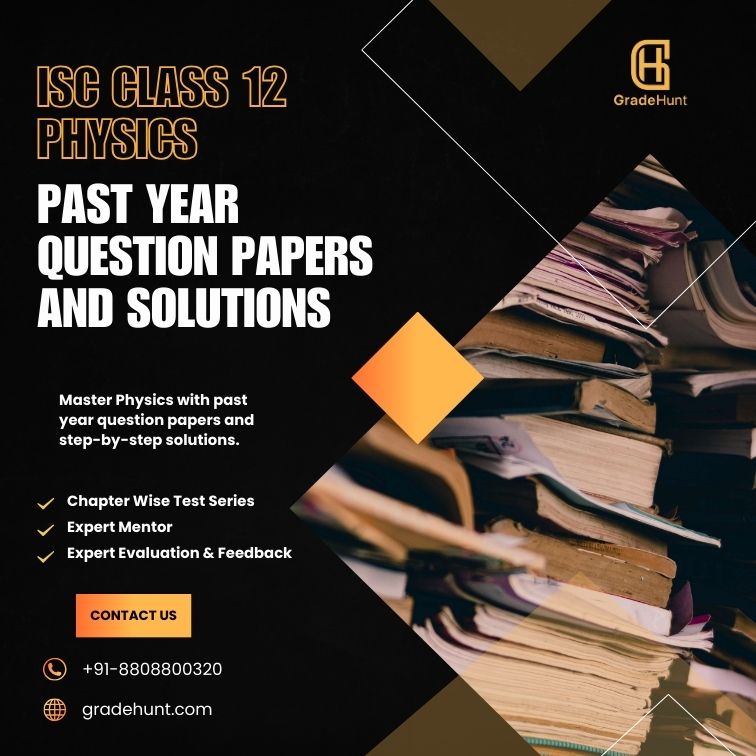
ISC Class 12 Physics Past Year Question Papers and Solutions
Physics is wild. Mechanics, optics, circuits. It’s like sci-fi stuff. But those numericals? They can trip you. Want to score big? Past year papers are gold. They show the exam’s flow. Waves, electricity, magnetism. You’ll spot the big topics. No surprises on test day.

ISC Class 12 English Literature Past Year Question Papers and Solutions
English Literature kinda awesome. Poems, plays, novels. It’s like living in stories. But those questions? They dig deep. Want to ace it? Past year papers are clutch. They show the exam’s vibe. Themes, characters, quotes. You’ll know the deal. No shocks on exam day
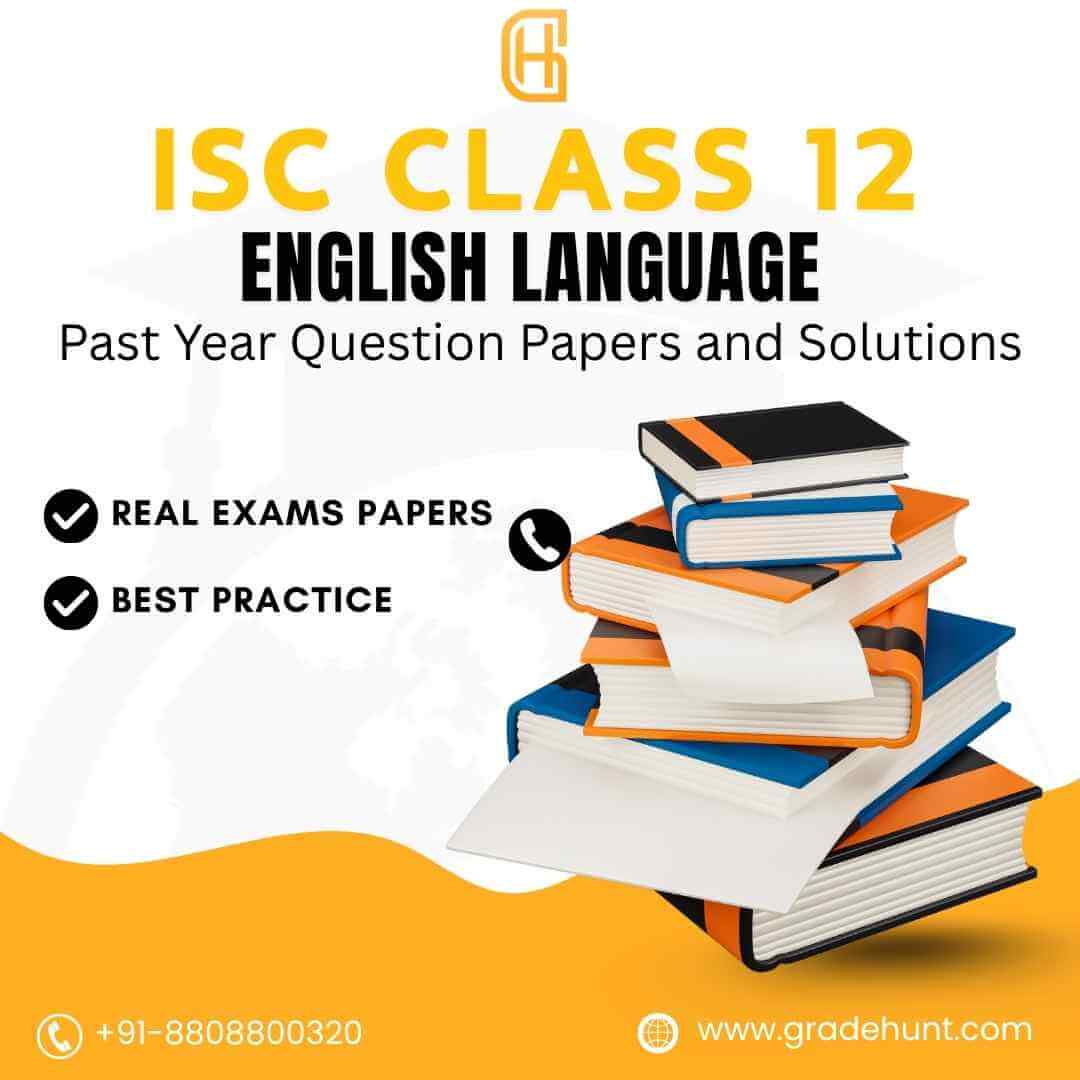
ISC Class 12 English Language Past Year Question Papers and Solutions
English Language can trick you. Essays, reports, comprehension. It piles up fast. Want to nail it? Past year papers are your buddy. They show the exam’s flow. Spot those grammar traps. Writing formats? You’ll be ready. No surprises on test day. Practice makes it smooth.

ICSE Class 10 Computer Applications Past Year Question Papers and Solutions
Computer Applications is awesome. Coding, logic, Java, it’s like building stuff. But those programs? They can trip you up. Wanna ace it? Past year papers are a lifesaver. They show you the exam’s vibe. Loops, classes, arrays, you’ll spot the pattern. No surprises on test day.

ICSE Class 10 Commercial Studies Past Year Question Papers and Solutions
Commercial Studies is dope. Business, marketing, finance, it’s like running a company. But those terms? They can pile up. Wanna score big? Past year papers are key. They show you the exam’s flow. Trade, banking, advertising, you’ll know what’s coming. No shocks on exam day.

ICSE Class 10 Economics Past Year Question Papers and Solutions
Economics is super cool. Money, markets, trade, it’s real-world stuff. But those graphs? They can twist your brain. Wanna ace it? Past year papers are your best friend. They show you the exam’s vibe. Supply, demand, banking you’ll spot the pattern. No surprises on test day.

ICSE Class 10 Biology Past Year Question Papers and Solutions
Biology’s all about life. Sounds fun, right? But diagrams, processes can be tricky. Wanna score high? Past year papers are a lifesaver. They show you the exam’s pattern. Cells, genetics, and ecosystems, you’ll see what’s hot. No shocks on exam day.

ICSE Class 10 Chemistry Past Year Question Papers and Solutions
Chemistry’s a crazy ride. Reactions, equations, elements, it’s intense. Wanna ace it? Past year papers are your secret weapon. They show you the exam’s flow. Organic, inorganic, mole concept, you’ll know the vibe. No surprises when you sit for it.

ICSE Class 10 Physics Past Year Question Papers and Solutions
Physics is kinda awesome. Motion, light, electricity—it’s like magic. But those numericals? They can trip you. Wanna score big? Past year papers are a game-changer. They show you the exam’s style. Mechanics, optics, circuits—you’ll spot the big topics. No shocks on test day.

ICSE Class 10 Mathematics Past Year Question Papers and Solutions
Math’s a wild ride. Some days it clicks. Others? Total chaos. Wanna crush it? Past year papers are your best bet. They show you the exam’s flow. Algebra, trigonometry, geometry—you’ll know what’s coming. No surprises when you open the paper.

ICSE Class 10 Geography Past Year Question Papers and Solutions
Geography’s pretty cool. Maps, rivers, climates—it’s like a world tour. But those questions? They can mess you up. Wanna ace it? Past year papers are the way to go. They show you the exam’s vibe. Topography, resources, population—you’ll spot the pattern. No shocks on exam day.

ICSE Class 10 History And Civics Past Year Question Papers and Solutions
History and Civics?
It’s like time travel plus politics. Dates, events, laws—can feel heavy. Wanna ace it? Past year papers are a lifesaver. They show you the exam’s pattern. World wars, Indian independence, government stuff—you’ll know what’s up.

ICSE Class 10 English Literature Past Year Question Papers and Solutions
English Lit’s kinda fun, right? Poems, stories, plays—it’s like a storybook. But those questions? They can get deep. Wanna score big? Past year papers are gold. They show you what the examiners love. Character sketches, themes—you’ll know the vibe.

ICSE Class 10 English Language Past Year Question Papers and Solutions
English Language can be tricky. Essays, grammar, comprehension—it’s a lot to handle. Wanna ace it? Past year papers are your best friend. They show you how the exam rolls. You’ll spot the usual question types. No shocks when you sit for it.

Which Board is Best in India? A Comprehensive Analysis
Choosing the right education board is a pivotal decision for students and parents in India. With a multitude of options—CBSE, ICSE, State Boards, IB, IGCSE, and NIOS—each offering distinct philosophies, curricula, and advantages, the question “Which board is best in India?” does not have a one-size-fits-all answer. Instead, the best board depends on a student’s individual needs, career aspirations, and learning style. This article provides a detailed comparison of the major education boards in India, highlighting their strengths, limitations, and suitability for different types of learners.

ISC Exam Dates 2026 for Class 12: All You Need to Know
For students preparing for the Indian School Certificate (ISC) Class 12 board exams in 2026, staying updated about the exam schedule is crucial. The ISC exams, conducted by the Council for the Indian School Certificate Examinations (CISCE), are a pivotal milestone, determining college admissions and future academic prospects. This comprehensive guide covers the expected ISC exam dates for 2026, the timetable release schedule, practical exam details, preparation strategies, and essential exam day instructions

ICSE Exam Dates 2026 for Class 10
The ICSE (Indian Certificate of Secondary Education) Class 10 board exams are a pivotal milestone for students across India. For 2026, the exam schedule is set to bring significant changes, offering more flexibility and opportunities for students to perform at their best. This blog covers the expected exam dates, the new dual-exam system, application timelines, tips for preparation, and essential exam day guidelines for ICSE Class 10 students.

Top 10 ICSE Schools in India in 2025-26: A Comprehensive Guide for Parents and Students
The Indian Certificate of Secondary Education (ICSE) is recognized as one of the most robust and comprehensive school boards in India. Renowned for its well-structured curriculum and emphasis on English language proficiency, ICSE offers a balanced academic environment combining scholastic excellence with holistic development. With parents increasingly prioritizing quality education that prepares children for global opportunities, choosing the right ICSE school becomes a critical decision.
In this blog, we explore the Top 10 ICSE Schools in India in 2025, based on academic reputation, infrastructure, faculty quality, extracurricular exposure, and alumni success.
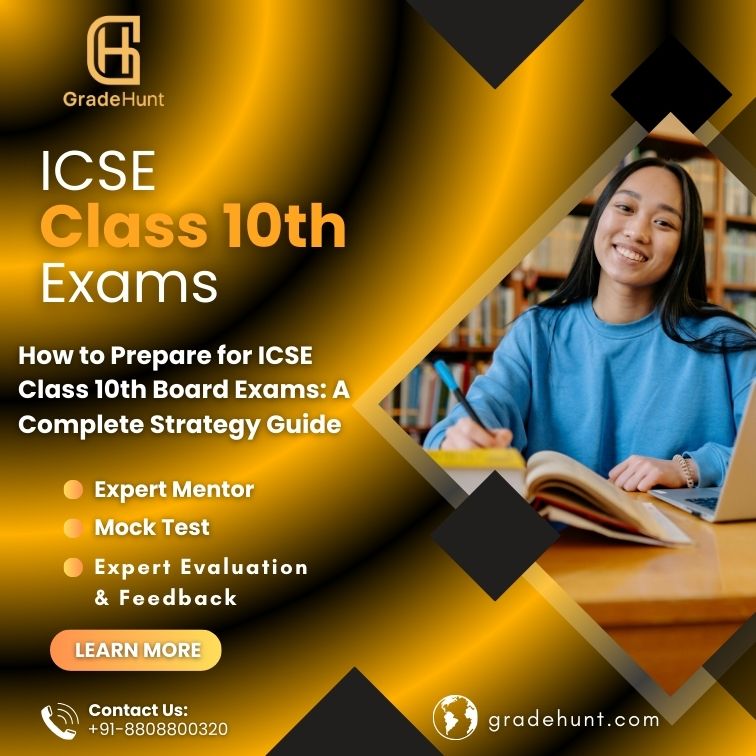
How to Prepare for ICSE Class 10 Board Exams: A Complete Strategy Guide
The ICSE Class 10 Board exams are a turning point in every student’s academic journey. With a broad syllabus and in-depth subject coverage, ICSE is known for its emphasis on analytical thinking, English language skills, and conceptual understanding. Preparing for these exams requires more than just hard work—it demands a smart, strategic approach.
This blog will guide you through proven strategies, time management techniques, and subject-wise tips to help you perform at your best in the ICSE Class 10 board exams.

How to Prepare for ISC Class 12 Board Exams: A Complete Guide for Success
The ISC (Indian School Certificate) Class 12 Board exams are not just academic assessments—they’re a gateway to your future. Whether you’re aiming for admission to top universities in India or abroad, preparing for competitive exams, or just trying to score your personal best, the importance of these board exams cannot be overstated.
Unlike Class 10, the Class 12 ISC syllabus is deeper, subject-specific, and aligned with future academic and career choices. It demands more critical thinking, analytical skills, and consistent effort. But with the right strategy, resources, and mindset, you can excel in ISC Class 12 Board Exams.
This blog provides a step-by-step preparation strategy to help you stay focused, productive, and exam-ready.

ISC Class 12 Physical Education Syllabus 2025–26
Physical Education is a necessary subject to foster health, fitness, and well-being in students. The ICSE Class 12 Physical Education syllabus for 2025–26 focuses on the scientific study of sports, physical fitness, and allied sciences. It balances theoretical concepts with practical procedures to enable students to learn the relevance of physical activity and prepare them for healthy living.

ISC Class 12 Business Studies Syllabus 2025–26
Business Studies provides learners with facts related to business enterprise management and operations. The syllabus is structured in a way that it addresses all the required topics, such as the nature of business, organisation types, management principles, marketing, finance, and business environment. It enhances managerial capabilities and practical know-how, shaping students for exams as well as business practice purposes.

ISC Class 12 Economics Syllabus 2025–26
Economics is the analysis of decision-making by governments, business organisations, and individuals on the use of resources. ICSE Class 12 Economics syllabus for 2025–26 introduces students to the concepts of micro- and macroeconomics like production, consumption, market structures, national income, and economic policies. The syllabus builds analytical thinking and economic insight in the students, making them ready for the board examination as well as further studies in commerce, business, and social sciences.

ISC Class 12 Accounts Syllabus 2025–26
Accounts is a core subject for students in commerce, business, or finance streams. The ISC Class 12 Accounts syllabus for 2025–26 is designed to deepen students’ understanding of financial accounting principles, partnership and company accounts, and financial statements. It aims to develop students' skills in recording, analyzing, and interpreting financial transactions, preparing them both for board exams and real-world business applications.

ISC Class 12 Maths Syllabus 2025–26
Class 12 Mathematics is essential for developing problem-solving abilities and logical reasoning skills. The ICSE Class 12 syllabus for 2025–26 covers higher algebra, calculus, geometry, and statistics. It prepares students for advanced studies in science, engineering, economics, and commerce. The syllabus offers a balanced mix of theory and practical application, fostering analytical thinking and numerical accuracy.

ISC Class 12 Biology Syllabus 2025–26 Outline
Biology is the science of studying life and their interaction with the environment. The ICSE Class 12 Biology syllabus for 2025–26 centers around an understanding of life processes, genetics, ecology, and human physiology. The syllabus builds basic knowledge essential for medical professions, biotechnology, environmental science, and research. It combines theory and lab experiments to develop observation skills, scientific knowledge, and reasoning ability, preparing students for board exams as well as competitive entrance exams.

ISC Class 12 Chemistry Syllabus 2025–26 Structure
Chemistry is a science subject which enables students to study the composition, structure, properties, and changes in matter. The ICSE Class 12 Chemistry syllabus for 2025–26 aims to foster knowledge in physical, organic, and inorganic chemistry. It provides a platform for advanced studies in science, engineering, medicine, and allied sciences. The syllabus integrates theoretical concepts with laboratory exercises for the improvement of analytical skills and scientific thinking and prepares the students well for board exams as well as competitive exams.

ISC Class 12 Physics Syllabus 2025-26 at a Glance
Physics forms the foundation of contemporary science and technology. The 2025-26 ICSE Class 12 Physics syllabus is formulated to facilitate improved conceptual knowledge coupled with problem-solving and analytical capabilities. It acts as the basis for engineering, research, space science, and technology careers. From the secrets of electromagnetism to the marvels of contemporary physics, this syllabus is all about balance between experiment and theory, allowing you to relate scientific principles to practical applications. Whether board or competitive exams, this course provides you with the correct thrust.

ISC Class 12 English Literature Syllabus 2025-26
ICSE Class 12 English Literature is an excursion of immortal themes, rich poetic thinking, and vibrant characters. The 2025-26 syllabus is a broad selection of drama, prose, and poetry, where students can discover the richness of human feelings, social structure, and philosophical thinking. Literature study makes one more analytical, more sympathetic, and more competent in the use of language. Through a complex combination of classics and modern works, this syllabus sets students up for exams as well as a lifelong love of literature.
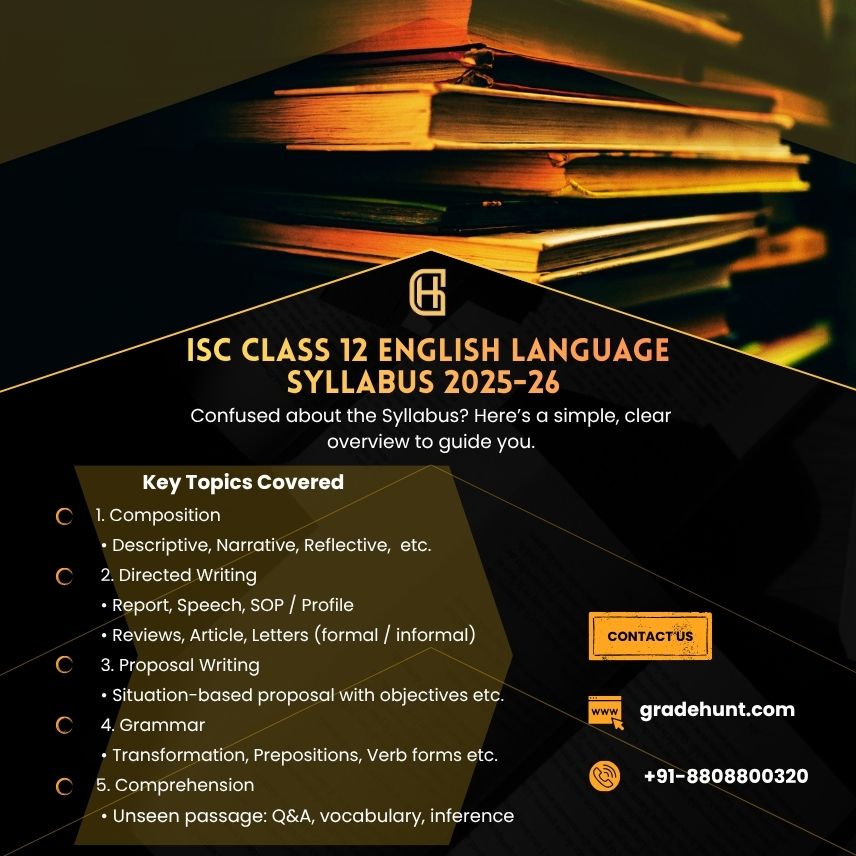
ISC Class 12 English Language Syllabus 2025-26 | Check latest Update
ICSE Class 12 English Language is more than just grammar and essays, much more. It directly impacts how students argue, think, and articulate ideas clearly and well. The new 2025-26 syllabus targets making writing skills simpler, logical reasoning power development, and developing comprehension skills gradually. Whichever your assignment—composing a good report, building an effective argument, or analysis of a given passage—English Language is an integral element of scholarly and professional achievement. It's an essential subject that refines clarity, style, and confidence in expression—a set of skills necessary for any profession in the future.

ICSE Class 10 Computer Applications Syllabus 2025-26 | Complete details
Computer Applications is an essential subject that introduces students to programming fundamentals and computational thinking. In today's technological times, it is crucial to understand how software works. The ICSE Class 10 Computer Applications syllabus of 2025-26 places strong focus on strengthening students' foundations in Java programming, object-oriented concepts, and problem-solving techniques. It equilibrates theory concepts with practice-oriented programming exercises so that students can develop effective and clean code. The course makes the students ready for advanced computer studies and develops skills very in demand in today's digital economy.
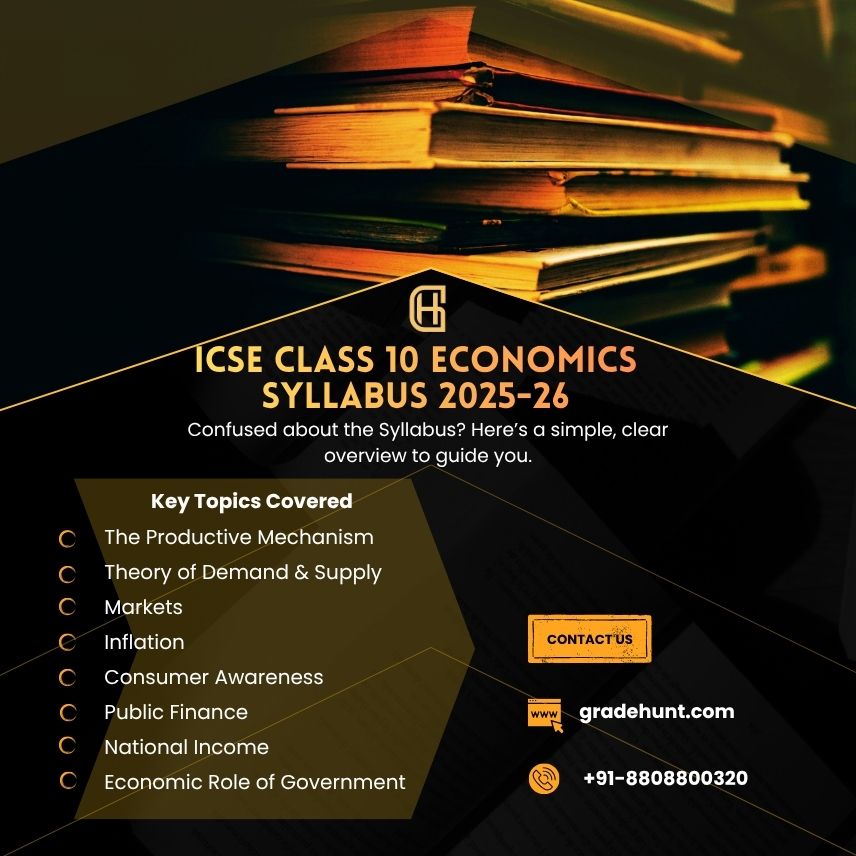
ICSE Class 10 Economics Syllabus 2025-26
Economics is the analysis of how people, societies, and countries use limited resources to meet their unlimited wants. It uses concepts like production, consumption, distribution, and intervention of the government in the economy. The ICSE Class 10 Economics syllabus of 2025-26 has been planned to replicate a theoretical background with pragmatic implementation. It assists the students in learning economic problems confronting the world, analysing market forces, and making sound decisions. Micro and macroeconomic branches are all covered under the curriculum that focuses on cultivating economic consciousness and thought necessary for the 21st-century student.

ICSE Class 10 Biology Syllabus 2025-26: Detailed Topic-wise Syllabus
Biology is a term used to denote the study of living organisms. It explains how life exists and develops. ICSE Class 10 syllabus is well designed. It deals from fundamentals to in-depth topics such as cell division, human body, health, environment, and genetics.
Students are instructed in how the human body functions. The brain, heart, kidneys, hormones, and immunity are discussed. Plant and animal reproduction are included. Ecology and pollution are covered, relating biology to practical issues. Diagrams, flowcharts, and application are used to explain things. Practicals are also prioritised to explain theory more effectively.
This course offers the students not only exam preparation but competitive biology streams as well.

ICSE Class 10 Chemistry Syllabus 2025-26: Chapter-wise Detailed Overview
Chemistry is the science of studying matter and changes occurring within it. This syllabus introduces students to chemical reactions, elements, compounds, and laboratory experimental work. It lays a solid foundation for comprehending the material world and its transformation.
The course covers basic concepts such as atomic structure and classification in the periodic table. It proceeds to chemical bonding and formulae. Acids, bases, salts, and metals are taught to students. Organic chemistry begins with carbon compounds. Practical skills are also given due importance throughout to relate theory to experiments.

ICSE Class 10 Mathematics Syllabus 2025-26: Detailed Chapter-wise Structure
Mathematics is not a subject that teaches numbers. It makes the mind think logically and effectively reason out problems. The syllabus consists of a vast amount of mathematical concepts, ranging from simple algebra to intricate geometry and statistics. It's aimed at challenging the students and sharpening their reasoning abilities.
The course starts with the learning of real numbers and polynomials. It proceeds with solving equations and sequence. Geometry classes deal with shapes, angles, and construction. Area and volume of solids are also learned by the students. Trigonometry and probability enable them to use mathematics in everyday ways. Each subject is selected with care to make a solid foundation.

ICSE Class 10 Geography Syllabus 2025-26: Full Chapter-wise Guide
Geography helps students to understand the physical make-up of the Earth as well as the connection between humans and nature. The syllabus involves physical and economic geography. It defines how processes of Earth shape the world and how humans utilise resources. It creates awareness about the environment and analytical minds.
The syllabus starts with the introduction of simple concepts such as the composition of Earth and atmosphere. It studies climate, natural vegetation cover, and soils. It then proceeds towards Indian geography, e.g., landforms, climatic zones, agriculture, and industries. It then studies resources, their utilisation, and sustainable development.
Study of these subjects readies learners to study geographic trends and their impacts on societies. Geography promotes right behaviour towards nature. It connects man to nature.

ICSE Class 10 Physics Syllabus 2025-26: Comprehensive Chapter-wise Division
Physics enables us to learn the basic concepts that govern nature. The syllabus introduces students to basic concepts like motion, force, energy, and electricity. Theory and practice are blended in it. The goal is to instill a scientific mindset and problem-solving capabilities.
The topic starts with the measurement of physical quantities and the laws of motion. It then progresses to work, energy, and power to explain the way things move and function. The curriculum covers the nature of light, sound, and waves and the way energy is transferred. The subject also covers electricity and magnetism, utilized in everyday devices.
Experimental exercises and numbers form an integral component of the syllabus. These provide students with the opportunity to implement ideas and build analytical skills. Physics weaves class learning together with natural phenomena.

ICSE Class 10 History and Civics Syllabus 2025-26: Detailed Chapter-wise Synopsis
History and Civics are the two subjects that widen the awareness of the world surrounding the students. History uncovers the struggle, achievement, and change that defined nations. Civics identifies the roles of governments and the significance of democracy. This syllabus interweaves these two subjects to yield knowledgeable and responsible citizens.
In History, students study European nationalism, which created international politics. They study India's independence struggle through important movements and leaders. Important world events like the World Wars and the rise of international organisations are studied in the syllabus. The topic of Age of Industrialisation explains how technology transformed societies and economies all over the world.
Civics covers India's Constitution and its fundamental values. Elections process, political parties, the working of the government at various levels, and the challenges before democracy in a country like India are taught to the students. Social concerns such as gender, caste, and religion are taught so that awareness and equality are generated.

ICSE Class 10 English Literature Syllabus 2025-26: Complete Chapter-wise Study Guide
English Literature opens the door to classic and modern masterpieces. The syllabus includes prose, poetry, drama, and a novel, developing language skills and imagination. Awareness of themes and characters is essential.
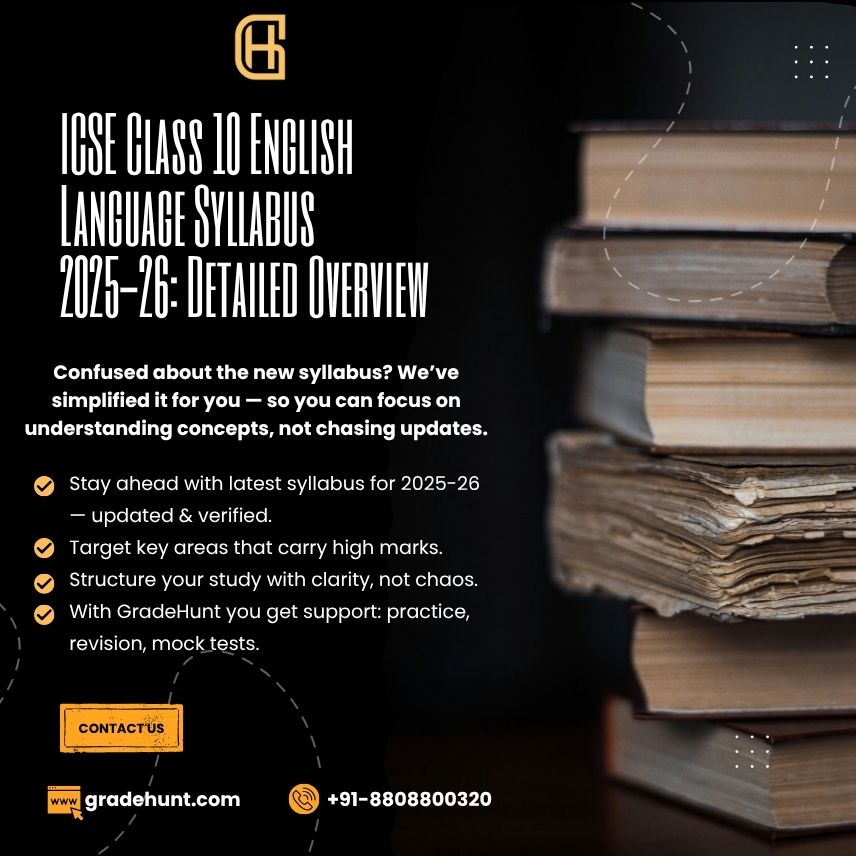
ICSE Class 10 English Language Syllabus 2025-26: Detailed Overview
English Language plays a significant role in communication. The syllabus enhances grammar, writing, and reading. It prepares students to introduce themselves confidently and effectively. Below is a detailed overview of the key subjects.